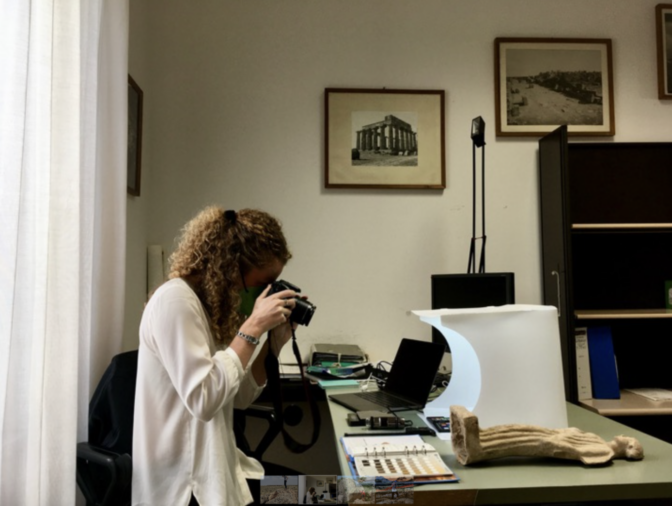In her research, “Fruit for the God(-desses): Re-evaluating Vegetal Representations in Sacrifice and Offerings in Greek Sanctuaries (8th-1st Centuries BCE),” Andrea Samz-Pustol examines the role fruits such as pomegranates and quinces played in Greek sanctuaries and explains the ways we can apply their ancient symbolism to our modern day world.
Samz-Pustol graduated from the University of Wisconsin in 2010 with a BA in Classics and Art History and has recently returned to UW after receiving a Classics MA from the University of Kansas. Now she works as the assistant director of the Constellations Program and teaches in the classical and near eastern department while also working to complete her PhD in classical and near eastern archeology at Bryn Mawr College.
Samz-Pustol said her research is inspired by her time in Greece, her passion for food festivals and her background growing up on a farm in Wisconsin. The discovery of a fruit plate artifact at a museum associated with her site work in Sicily and Martina led her to think about the lack of research surrounding fruits and vegetables in the ancient world.
Although there are many facets of her research, fruit in relation to medicine, women and low income populations in ancient Greece is one aspect she highlights with modern-day implications. Specifically, the issue of access to healthy foods and medicine.
“Because fruit was cheap, real fruit and fruit representations were likely available to a wide variety of socio-economic classes and notably in marginalized and low-income populations in ancient Greece,” Samz-Pustol said. “However, modern fruits and veggies in the Western world and especially in the US tend to be expensive and are cost-prohibitive for many populations.”
According to Samz-Pustol, the Hippocratic text indicates that food was used as medicine in the ancient world, an aspect that modern-day researchers are exploring. She said the idea of fruits and vegetables as medicine is becoming more prevalent in scientific studies which are revealing the health benefits such as mitigating the risk of high blood pressure, diabetes, and cardiovascular disorders.
This has prompted the creation of produce prescription programs where fruits and vegetables are prescribed supplemental to prescription drugs. Research from the American Heart Association has found that participation in these programs is associated with improvements in vegetable intake, food insecurity, glycated hemoglobin and high blood pressure. In 2017, the Wholesome Wave Program partnered with the Willy Street Co-Op in Madison to offer prescriptions of fruits and veggies to low-income populations, but today this program is no longer running due to a lack of funding.
Samz-Pustol said there are no programs like this in Madison currently, but there are ways UW can help reinvigorate this program or take inspiration from its model. She said that as a low income student and first generation American, this is something she values and is reflected in the Wisconsin Idea.
“It’s important to me to contribute to the general well-being of the population outside of the university setting,” Samz-Pustol said. “This was something that was instilled in me, especially as an undergrad here through the Wisconsin Idea. The core belief of the Wisconsin idea is that education should influence people’s lives beyond the boundaries of the classroom.”
This concept is one that prompted the creation of the First Generation Low-Income Federation. An organization Samz-Pustol co-founded within the society for classical studies that helps first generation low-income undergraduate students, graduate students and professors working in the realm of the ancient Mediterranean.











